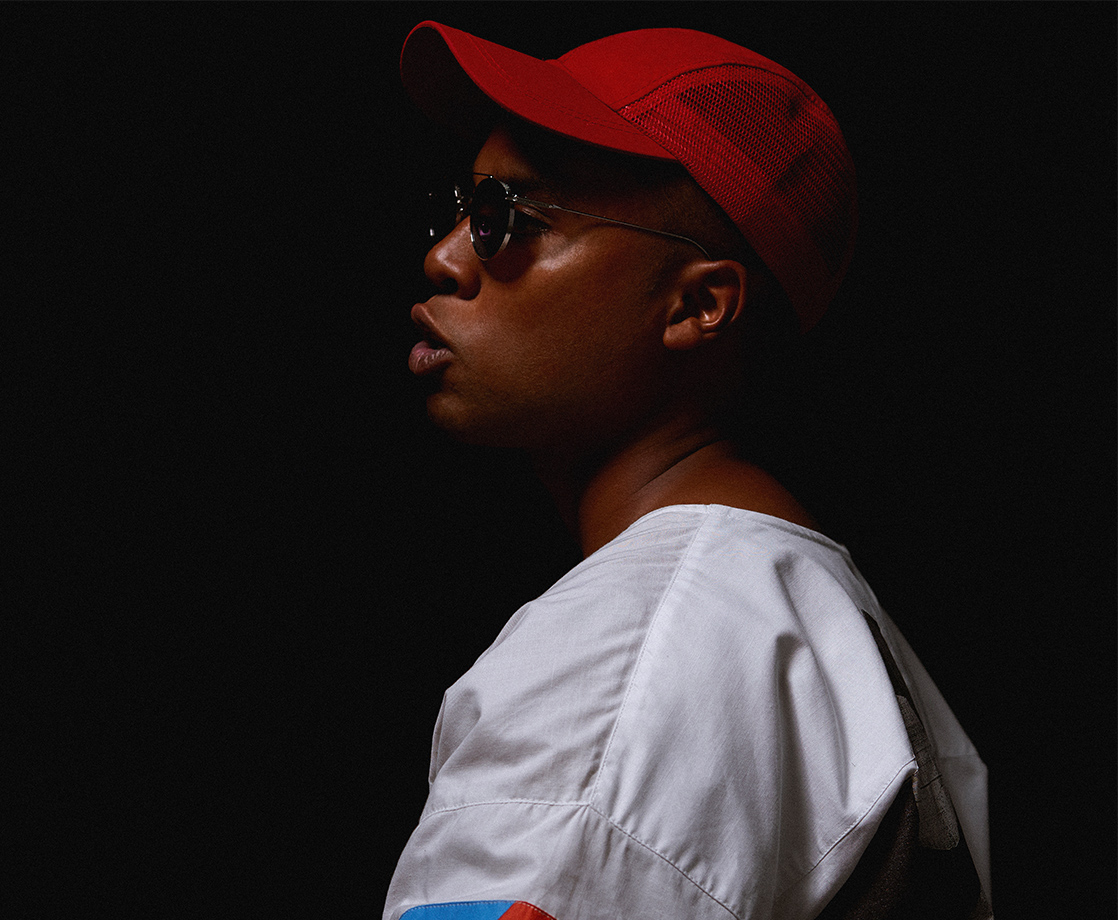Photos by Mathieu Fortin
My earliest memory of Lunice is his cameo in Azealia Banks' viral "212" video from 2011. Although the French Canadian born Lunice Fermin Pierre II would later produce for the Harlem firebrand, his role in "212" is purely visual. He dances goofily, unabashedly, while another Montreal-based producer, Jacques Greene, spends his cameo simply nodding to the beat and looking cute. At the time, Lunice already had two instrumental EPs out on longtime home LuckyMe Records, and although they still sound vibrant and interesting, his first major dance performance charmed in a way no beat tape could.
Flash forward one year to 2012, and Lunice hit the big time for real alongside Scottish producer Hudson Mohawke in the groundbreaking trap-rave duo TNGHT. Their one release to date, a self-titled EP, was the final vice grip needed to fully conjoin the worlds of Southern rap and big-tent EDM, setting off a shockwave that continues to reverberate through HARD music festivals and Future mixtapes. The sea change was most evident on Kanye West's Yeezus the following year, on which TNGHT's unreleased gem "R U Ready" formed the backbone of the pivotal "Blood on the Leaves." I caught one of TNGHT's victory-lap shows shortly before Yeezus, and even in a venue packed full of people who came to hear his beats, Lunice still made dancing his focal point. While HudMo spent the entire show behind the boards, his co-star was wyling out in front of the crowd for at least half of the show.
Any last doubts I had about Lunice's devotion to dance were erased with the video for "Mazerati," the lead single from his new album. His moves were treated as a sideshow in "212," but here, they're at the forefront, not just completely dominating the visuals but seeming as integral to the full package as the instrumental. He's expressive, abstract, theatrical. A simple, well-coordinated "dance video," this is not.
The corresponding album, CCCLX (Roman numerical for "360"), arrives this Friday bearing attributes that seem equally as stage-ready. Its four interludes are labeled "Curtain," "Intermission," "Costume," and "Black Out," like they're separating acts of a play. Guest vocalists such as Le1f, King Mez, and Denzel Curry flit in and out like bit-part actors, with Montreal MC CJ Flemings taking a narratorial role in his three separate appearances. Longtime Lunice fans will recognize flashes of every chapter of his musical career in the beats — from trappy down-pitched "yups" to playful 808s to fizzy synths — but everything's more dramatic and weightier than it's been in his past.
At the close of a five-year hiatus since the TNGHT EP dropped, with only a four-track EP in between, Lunice has been debuting his involved CCCLX show at European festivals and (hopefully) gearing up for an even more elaborate tour. MERRY JANE caught up with him on Skype while on a coffee shop-filled break in Amsterdam. An ebullient presence even through video chat, Lunice filled us in about CCCLX's lengthy incubation period, his musical and nonmusical inspirations, his love for dance, and the valuable advice he got from one Kanye West.

MERRY JANE: Hi Lunice! What are you up to in Amsterdam?
Lunice: I was just walking out of a coffee shop, actually. It's absolutely amazing. I've been going to a bunch of shops and taking notes on different strains. I'm between festival performances and I could either head back to London or just stay here, so I thought I might as well stay, work on my mix, and have the pleasure of visiting a few shops.
Sounds like a pretty relaxed schedule.
Yeah. Rather than going out and doing two or three weeks straight of shows, I'm doing five or six festivals in Europe. I like that consistency because I've generally kept my online presence low over the years, and have instead focused on designing the stage, working on how I'd perform and interact with the crowd, rather than try to perfectly time posting something online. I still do social media, but generally I'm not dependent on it.
Was that the biggest factor in your decision to "go dark" over the past couple of years?
Pretty much. It was right after the last TNGHT tour, and I was thinking, How would I want to start this album? Do I want it to be straightforward, just a bunch of music that I've been making lately? Thinking about about it a bit more, I realized that's not really me. I'm the kind of guy that's generally thorough about whatever I try to do.
With that in mind, I remembered years ago, when listening to an old Waka Flocka song called "Industry," he just starts off with like, 'Straight up, 360 homie,' or something along the lines of that. I thought, Yeah, that's true. I like that. Not only does "360" have that meaning of being generally well-rounded, but it could go beyond that to the whole cyclical concept.
That's when I realized that before I go forward with the whole concept, I need to figure myself out. I want to be sure that when I'm out there it's as honest and concrete as possible, and not a total act that's been put together for a certain time. It's more a presentation of, This is me, and this is the way I think creatively and process things, in hopes that you may catch it the same way.
So are most of the resulting songs actually five years in the making, or did it take a while to conceptualize everything first?
It definitely came in pieces. When I first started the album out in LA five years ago — shout out to Diplo for passing me his studio — I was working on [album tracks] "Mazerati" and "Tha Doorz." Before that, I would make a lot of beats back-to-back, and I was getting to a point where I was stuck in a certain loop, a style, a sound. I was afraid of writer's block, and I'm a very preventative kind of guy, so I'm always trying to avoid hitting a creative wall.
The first thing I started to do was just spacing out and doing things I like to do in life, besides just music — tending to my plants, fishing, drawing, photography. I would do other things to occupy myself and then [inspiration] would eventually just hit me. I got into a great flow, and I started to bring that flow over to the album. With "Mazerati," I just gave it a skeleton and let it breathe. I love doing that, working on shit and just forgetting about it, because when I do come back I have a whole new perspective. But what I didn't expect was showing music to other people and then them giving me pointers and constructive criticism.
Like Kanye?
Exactly. That was a huge turning point of, Whoa, this is valuable. I should start doing this more often. Lay out the skeleton, the idea, the concept, and then let it breathe, because I never know when I'll end up in a different session and I can show it to somebody else. That's when I learned that, when you work on music, you don't actually have to see it all the way through. If you feel that you're satisfied, listen to that and just stop, because chances are, you may be right. That was something I wanted to be very specific about before going out there again.
You mentioned a lot of extracurricular inspirations, but what about musical inspirations for CCCLX?
Most of my inspirations are theater-based, but when it comes to music, I'm usually just directly influenced by my environment. A lot of it has to do with London, with groups like Night Slugs, people like Bok Bok or Kelela. Kingdom out the US was another big one with Fade To Mind. LuckyMe and Brainfeeder, as well. Basically being from that whole environment of these types of artists is what shaped the sound of the album.
A lot of the music on there is rap music too, and most of that comes from Southern ideas. I'm heavily influenced by old Gucci Mane tapes, and the sound that actually came out of the trap. I've always been fascinated with the hood in terms of how they're innovative, time and time again, in terms of music, dance, creativity, clothing, everything. When that whole scene started coming out, the first thing that came to mind was shivers, because it's terrifying, the same way people were terrified by Mobb Deep back in the day. When things like that hit me in their rawest forms, that's when I get really passionate and start doing research.
I didn't necessarily want to make that type of music, but I wanted to understand why it made me feel fear. It wasn't necessarily what they were saying, it was the instrumentals, the way they looked, the way they were trying to express their point. That completely fascinated me. To this day, I'm still figuring out how to capture the essence of that and catch different reactions from the crowd, rather than just the usual rollercoaster of up-and-down, up-and-down, hook-bridge-drop. That's equally as fun, but I'm just trying to experiment and see if I can reach different emotions.
I saw on your Reddit AMA that you've also been listening to a lot of death metal. Did that inspire any parts of the album?
Oh of course, in terms of arrangement. The way they put things together, from album covers, to performances, to production, the aesthetic, the way it makes you feel, all the changes — all influenced me. Only a few years ago did it click with me, that this is modern classical music, in a sense.
Did you have specific vocalists in mind when making any of these songs?
I started with a list of artists, and actually met with 2 Chainz and Big Sean, and they were both into it. It was during the TNGHT stuff, because that gave us a lot of attention. But over time, from doing different tours and projects, I started to realize that it's very complicated to get a major artist onto a feature — not because they don't want to do it, but because of politics and logistics. Keeping that in mind, I was like, I'm going to go back to my city and see what's up, because at this point there must be a lot of new talent.
That's when I first came across CJ Flemings [who raps on three CCCLX tracks]. We met in the studio and next thing you know, I got him on my album. One night, I go to one of his studio sessions and he introduces me to Speng, a really fast spitter and great lyricist. I asked him if he could do a verse on one of my tracks, then rolled one and went outside to smoke, and by the time I come back dude's already done recording the whole verse. That was super inspiring to see, and moving on, I was like, Yeah, this is how it's gotta be. If you think about it, that's probably how it started for 2 Chainz and Big Sean too. They had their crews, they started their vibes, and brought it up like that. It only would make sense for me to do the same.
Denzel Curry was the last feature. It's crazy because the way he delivered, it's as if I sat down and explained exactly how I wanted it, but we hadn't even done any of that. At first we just had Denzel, but then he was like, 'Yo, I've got my crew too.' So I'm already I'm already bowing down to Denzel, and I'm like, Dude, I trust you. I get the whole track, and I couldn't even imagine anything bigger.
Stage presentation seems to have factored into the making of CCCLX very heavily. Do you have something elaborate planned for upcoming shows?
We actually just premiered the show at Sonar Festival in Barcelona. The way we arrange it is more like how you'd see a theater set up, objects onstage, sort of like the "Mazerati" video without the drywall. We used aluminum tubing to make the outlines of say, a sink or a chair or a wall. We set up a scene and I just interact within that whole space. For the time being it's just me, but eventually, I'd love to build it up to the point where I'd have other dancers.
When I toured with Madonna, she'd let me use the whole stage for dancing. She was cool with all that stuff to the point where she'd let her dancers come onstage and perform with me. I got used to have these frickin' intense professional dancers perform to my music, and got a feeling for how the crowd reacted. They loved it, considering how diverse her fanbase is. That's definitely something I'd like to take further and something that really factored into how I built the album — how the show was going to be presented from beginning to end.
Has dancing always come more naturally to you than music-making?
Definitely. There's no technical teachings, you just move around, you just [twirls on screen] and you're dancing.
But you don't often see DJs out there devoting that much of their show to their own dancing. Initially, did anyone say like, "Why are you out here the entire time instead of behind the boards?"
My whole career. At first, I used to be bummed out, but it makes complete sense when you're introduced to something generally unconventional. You look at something and go, You're not supposed to do that. I fall victim to that too — whenever we encounter new information, we often challenge it. That's a natural human reaction. You definitely see headliners and other acts get out in front right before the drop, or to shoot out t-shirts, but they're not usually out there for a while, dancing around, smiling, laughing with everybody. That's just super unusual.
But over time, I learned to appreciate that side of emotions from people, because it's almost like a stepping stone to critical thinking. I love the idea that I could get people to question things. The best example I could give is the way Kanye analyzed my music. He never once said, "This is wack, change it." He always found something good out of it that I could build on. So whenever you ask someone's opinion like, How does this chair look? And they go, "Well, it's ugly," and they don't go any further, that tells me you don't want to question it or look into more than that, and you'll never know more than that. That's what I feel is happening in general — that there's this monotony of just drops. I want to be the one guy that comes in and breaks it off, breaks the ice, but comes back to it. And then it's twice as meaningful for [the audience].
It's similar to what TNGHT did, giving people those drops they craved but unexpectedly combining it with a deep knowledge of trap. Then that kind of became a scene of its own.
We never expected that, obviously. Everything we've done is out of our own personal interest. It was basically our whole crew at LuckyMe going crazy and being like, "You have to put this out as an EP." We were like, We could just play it as an exclusive for all of us, but if you want, sure, let's do it. Whatever.
Then the reception was tenfold, and not even once have we thought like, Yeah, this is our shit. Nah. We don't like that feeling at all, because the moment you feel that is the moment you retire from general creation — you're just reincarnating what people know you for. The moment things started picking up, that's when we became a lot more cautious about every move. Like we were talking about previously, I think it's because of me cutting the project and getting a great reaction, that I now want more. So what can you do? You create more.
Preorder "CCCLX" from LuckyMe.
Follow Patrick Lyons on Twitter.











